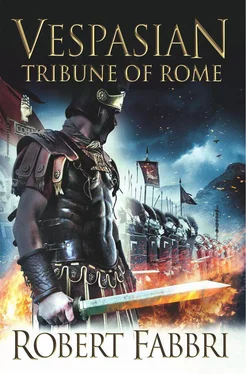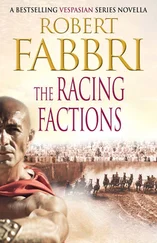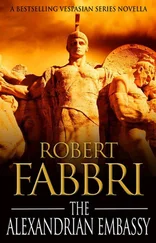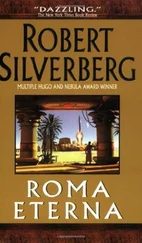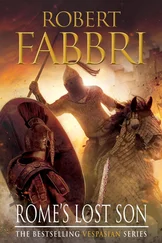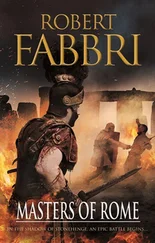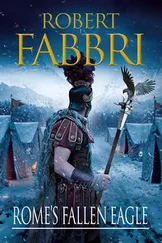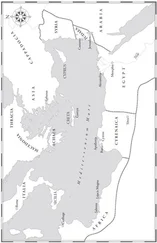Robert Fabbri - Tribune of Rome
Здесь есть возможность читать онлайн «Robert Fabbri - Tribune of Rome» весь текст электронной книги совершенно бесплатно (целиком полную версию без сокращений). В некоторых случаях можно слушать аудио, скачать через торрент в формате fb2 и присутствует краткое содержание. Жанр: Исторические приключения, на английском языке. Описание произведения, (предисловие) а так же отзывы посетителей доступны на портале библиотеки ЛибКат.
- Название:Tribune of Rome
- Автор:
- Жанр:
- Год:неизвестен
- ISBN:нет данных
- Рейтинг книги:3 / 5. Голосов: 1
-
Избранное:Добавить в избранное
- Отзывы:
-
Ваша оценка:
- 60
- 1
- 2
- 3
- 4
- 5
Tribune of Rome: краткое содержание, описание и аннотация
Предлагаем к чтению аннотацию, описание, краткое содержание или предисловие (зависит от того, что написал сам автор книги «Tribune of Rome»). Если вы не нашли необходимую информацию о книге — напишите в комментариях, мы постараемся отыскать её.
Tribune of Rome — читать онлайн бесплатно полную книгу (весь текст) целиком
Ниже представлен текст книги, разбитый по страницам. Система сохранения места последней прочитанной страницы, позволяет с удобством читать онлайн бесплатно книгу «Tribune of Rome», без необходимости каждый раз заново искать на чём Вы остановились. Поставьте закладку, и сможете в любой момент перейти на страницу, на которой закончили чтение.
Интервал:
Закладка:
The noise of the crowd coupled with the grating of the unsprung iron-shod wheels of countless carts and wagons pulled by baying beasts of burden rose to a crescendo as the two roads, quite literally, collided. Vespasian surveyed the chaos of the free-for-all as vehicles, humans and animals pushed and shoved in all directions trying to get off one road and on to the other. No one was willing to give way, for to do so would mean more delay and, no doubt, a savage push from the vehicle behind.
The family’s ex-legionary guards were now leading the way, beating a path through the crowd with sturdy poles as they inched their way on to the Via Nomentana. Once they had negotiated a passage on to the new road progress became easier as to their left and right the trade wagons and carts, which were not allowed into the city during the day, pulled off the road to wait for the sun to set. Once night had fallen they would continue their journeys to their final destinations, ensuring, with the rumble of their wheels and the cries of their drivers, that peace would never come to the streets and lanes of Rome at any time of the day or night.
Titus had just secured the services of a litter for Vespasia to transfer into, close to the Porta Collina, when from behind them came the deep boom of a horn and shouting so loud that it could be heard over the surrounding din. Looking back over his shoulder Vespasian could see the dyed-red horsehair-plumed helmets of a turma of cavalry, a troop of thirty men, wading through the crowd.
‘We’d better wait for them to pass,’ Titus said. ‘They look to be Praetorian Guard cavalry and they’re not very polite, especially if they’re escorting someone important.’
They cleared the road as the turma approached, four abreast. Their white, high-stepping stallions, eyes rolling and mouths frothing at the bits, forced their way through the crowd, stopping for no one. Any fool unlucky enough to come too close was beaten aside by their riders with the flats of their swords or the butts of their spears.
‘Make way, make way, imperial business, make way,’ their decurion shouted. The trumpeter gave another blast on his horn. The guards’ bronze breastplates and helmets inlaid with silver sparkled in the sunlight; red cloaks edged with gold billowed out behind them; everything about them spoke of the wealth and power of the imperial family that it was their duty to guard. They kept their formation with a rigid discipline, their muscular thighs and calves gripping the sweating flanks of their mounts, steering them in a straight line down the centre of the road. In the middle of the troop travelled an ornately carved wood and ivory litter whose occupants were enclosed by lavish maroon curtains decorated with astrological signs embroidered in gold and silver thread. From each corner protruded a pole that was supported at waist height by three massive Negro slaves marching in step, double time, in such a skilful manner that the litter appeared to glide along without so much as a jolt to disturb its precious cargo. The smoothness with which they carried the litter could only have been learnt by years of practice under the watchful eyes of overseers keen to punish any mistake with a liberal use of the whip.
Vespasian watched the imperial cortege scythe its way down the Via Nomentana. ‘Who do you think is in that, Father, the Emperor?’
‘No, I doubt it. When he’s not in Rome Tiberius spends more and more of his time down south and would never enter the city from this direction. That must be someone in the imperial household with estates up in the hills to the east,’ Titus replied as the litter drew level with them.
Just then a rabid dog, foam oozing from its jaws, startled by the booming horn and the loud clatter of the horses, leapt out from under a cart close to Vespasian and launched itself at the lead group of Negroes. It sank its teeth into the left thigh of the man nearest the litter. He went down screaming, desperately trying to tear the maddened beast off him. His comrades stopped abruptly, causing their burden to sway from side to side. Guards immediately encircled the immobile litter, spears pointing out towards the onlooking crowd as their decurion raced back to assess the situation. He took one look at the unfortunate slave wrestling with the mad dog and with two quick thrusts of his spear put both out of their misery. He shouted a swift order and the guards re-formed their marching order and the column prepared to move forward.
Before it did the curtains of the litter opened slightly and a young girl looked out. Vespasian held his breath; he had never seen such beauty. Her thick black hair, which contrasted perfectly with her ivory skin, fell in ringlets that rested on her slender shoulders. Jewels hung from her ears and around her throat. Her lips, full and painted dark pink, sat perfectly between a delicately pointed nose and a firm, proud chin. But it was her eyes, two shining blue stars, that held him transfixed as they rested on his, for a few quickening heartbeats, before she withdrew back inside and the litter began to move forward again.
A loud snort brought him back to reality.
‘Look at that, Father, your youngest son sitting there with his mouth flapping open like some carp just landed in a fisherman’s net,’ Sabinus roared. ‘I think the poor little sod has just caught a shot from Cupid. I’d bet he’d give his right hand to know who she is. Not that it would help much, he’s way below her league.’
Vespasian reddened as his father joined in the laughter. ‘That, my boy, was the most vacant that I’ve ever seen you look. I don’t suppose you liked her, did you?’ Still chortling, he turned to order their guards to lead off.
Vespasian was left staring dumbstruck at the dead dog whose jaws were still locked on to the black slave’s corpse. He had been hit by two thunderbolts in the space of as many hours: sudden, instant and inexplicable love for a city that he had only seen from afar and for a girl that he had only glimpsed for an instant. Who was she? But he’d probably never see her again. Gathering himself with difficulty, he turned his horse to follow his family, yet as he passed through the Porta Collina and entered Rome, his heart was still pounding.
CHAPTER VI
Once through the gate the Via Nomentana narrowed so that two carts could just pass each other. The makeshift huts and tombs on either side were replaced by three-, four- or even five-storeyed tenements – insulae – that prevented the sun from reaching the street level except for an hour or so around midday. Each building had open-fronted shops on the ground level selling all manner of products. Costermongers squeezed in between pork butchers and leather-goods salesmen; stores selling live poultry next to taverns, barbers, fortune-tellers and purveyors of small statuettes of gods and heroes. Sweating smiths hammered at ironwork on open forges alongside tailors hunched over their stitching and bakers filling shelves with loaves, pastries and sweet buns.
The cries of the shopkeepers advertising their wares resounded in the air, which was already bursting with the aromas, both sweet and foul, given off by such a variety of human activity. Vespasian was overwhelmed by the throng of people, free, freed and slave, going about their everyday business pushing and shoving each other in an effort to remain on the raised pavements so as not to soil their feet in the mud, made up mainly of human and animal excrement, which covered the road.
On the outside of the lower buildings, in order to maximise the rentable living space inside, rickety wooden staircases led up to equally precarious balconies that gave access to the rooms on the first and second floors. Women, mainly, populated these upper levels; they scrubbed garments on wooden boards beneath lines of nearly clean washing that fluttered in the breeze. They prepared the evening meal, which would be cooked in the local baker’s oven, whilst gossiping with their neighbours as their children squatted at their feet playing at knucklebones or dice. Brightly painted whores called out their services and fees to the passersby below and made lewd jokes with each other, cackling with unashamed laughter, whilst the elderly and the infirm just sat and stared greedily at the life they could no longer participate in.
Читать дальшеИнтервал:
Закладка:
Похожие книги на «Tribune of Rome»
Представляем Вашему вниманию похожие книги на «Tribune of Rome» списком для выбора. Мы отобрали схожую по названию и смыслу литературу в надежде предоставить читателям больше вариантов отыскать новые, интересные, ещё непрочитанные произведения.
Обсуждение, отзывы о книге «Tribune of Rome» и просто собственные мнения читателей. Оставьте ваши комментарии, напишите, что Вы думаете о произведении, его смысле или главных героях. Укажите что конкретно понравилось, а что нет, и почему Вы так считаете.
